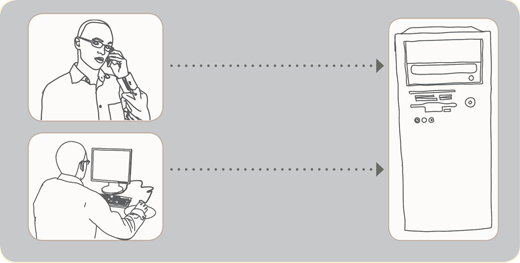
The Oral Wiki is a proposed database technology that would store audio recordings of Abunzi decisions. It would provide record, playback, tagging and commenting functionalities akin to those found on wikis. It would be accessible by phone and internet and would enable the ranking of decisions made by Abunzi. Abunzi and the formal justice system would each need to play a vital role in the database.
After two disputing parties arrive at a decision a recording could be made. The recording would need to encompass a description of the dispute and a description of the decision.
Database interfaces: phone & internet
The Oral Wiki would be accessible by phone because our primary user, the Abunzi, have greater access to phone than to internet. In the near-term the phone-based interface will be the primary emphasis of the project. The technology would also be available online for participants with access to internet such as those in government. The internet interface would provide for a smooth transition to an online setting once an internet infrastructure is in place in Rwanda.
Core phone functionality
To interact with the technology users would listen to verbal prompts on the phone and respond orally or by touching the numbered keypad.
Record a decision
Users could call into the database to record her/himself recounting a decision made for a dispute. After making the recording it could be tagged with suggested categories.
Rank decisions
To establish best practices we propose a system whereby the Abunzi would contribute to the database by ranking a certain number of recordings each month. Abunzi could make comments on others' decisions. This form of commenting on others' voice posts is comparable to the commenting capabilities on blogs and wikis where users may respond to a post. As the recordings are ranked, the highest ranked recordings would emerge as best practice examples.
Listen to recordings
IIf Abunzi call into the database to listen to best practices they would listen to a selection of recordings that represent best practice for a particular type of case. Users could sort the recordings by type of dispute or by level of government, such as district or sector. Abunzi could rank a recording, leave voice comments about decisions and listen to others' comments. A key feature of the system would be the fact that it is oral, which would allow everyone, including Abunzi who are not able to read and write, to submit decisions to the database.

|
